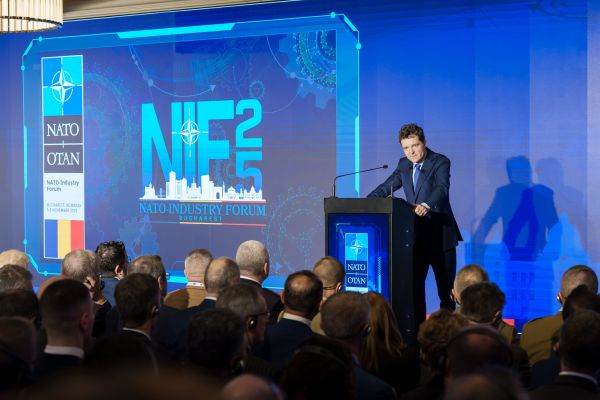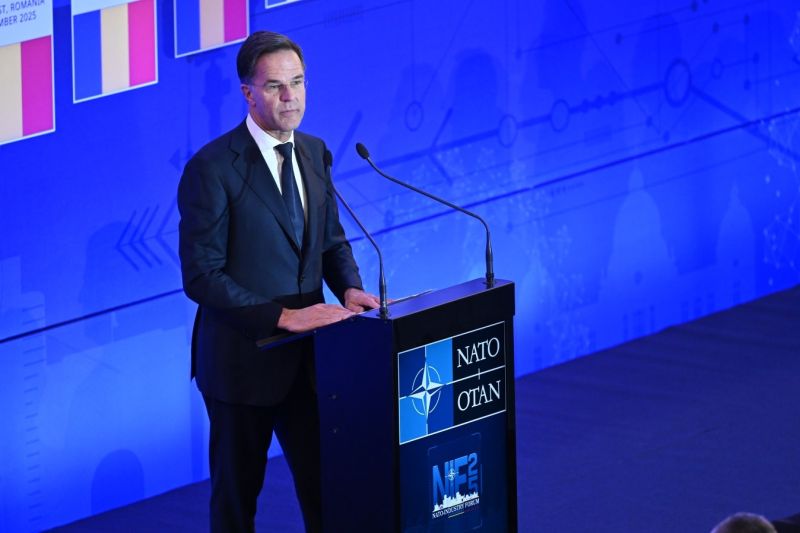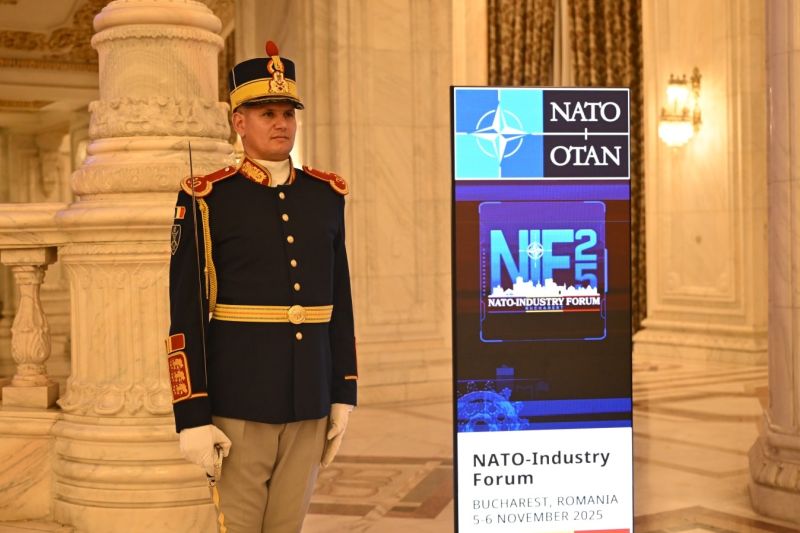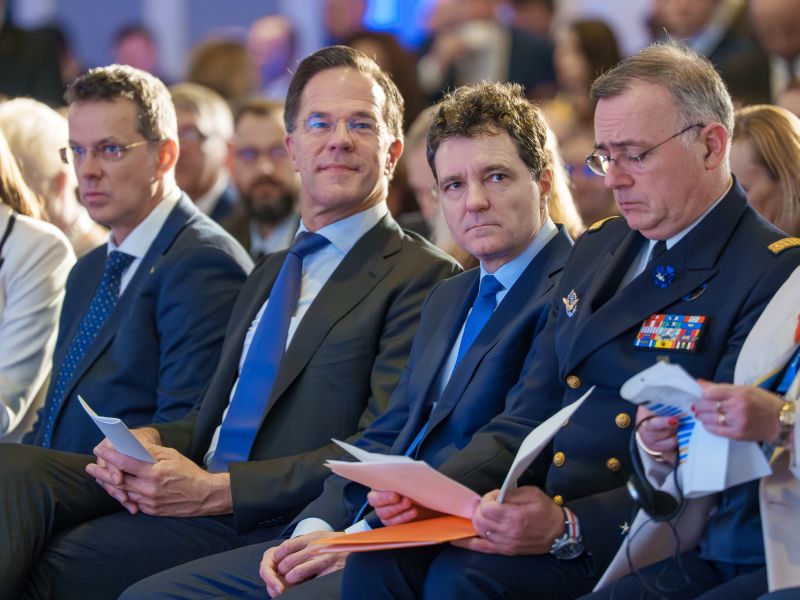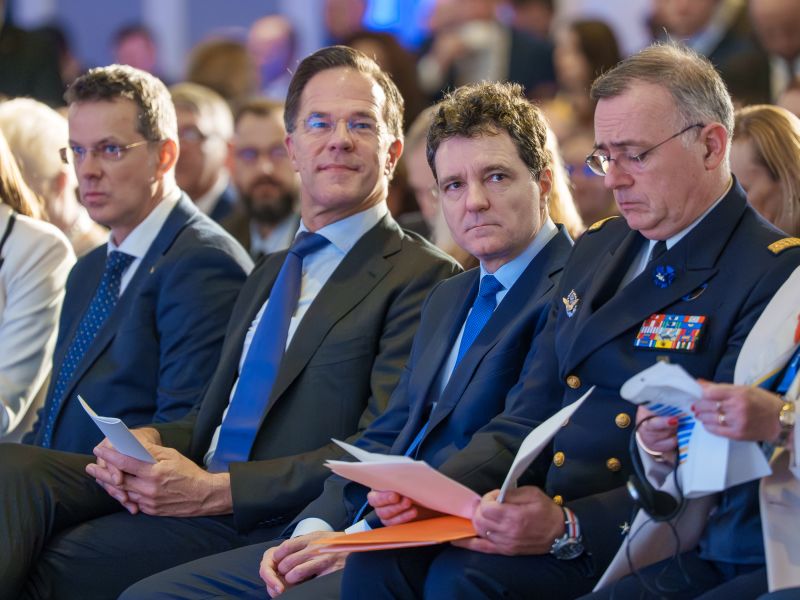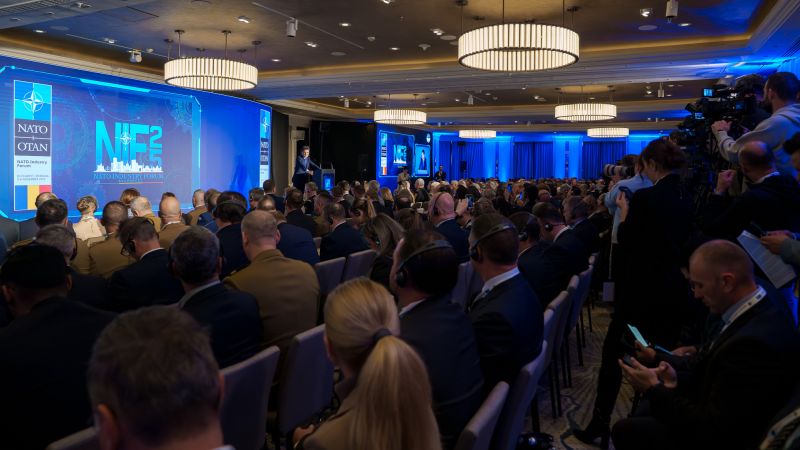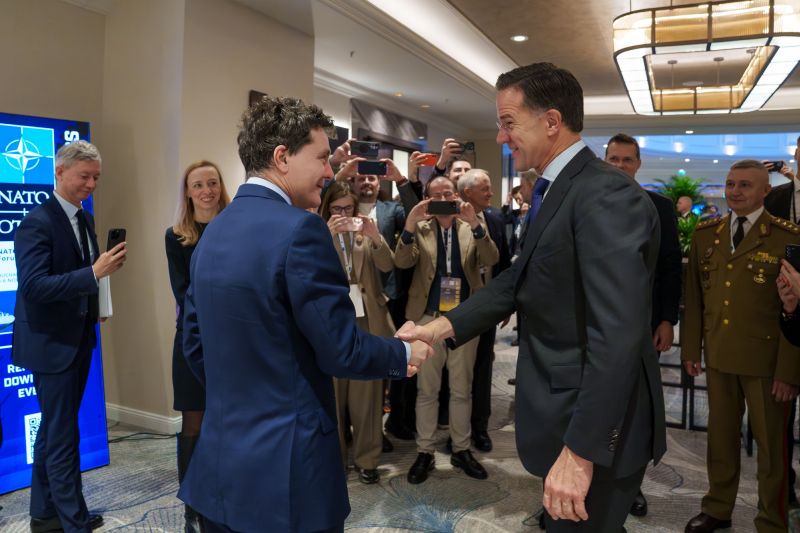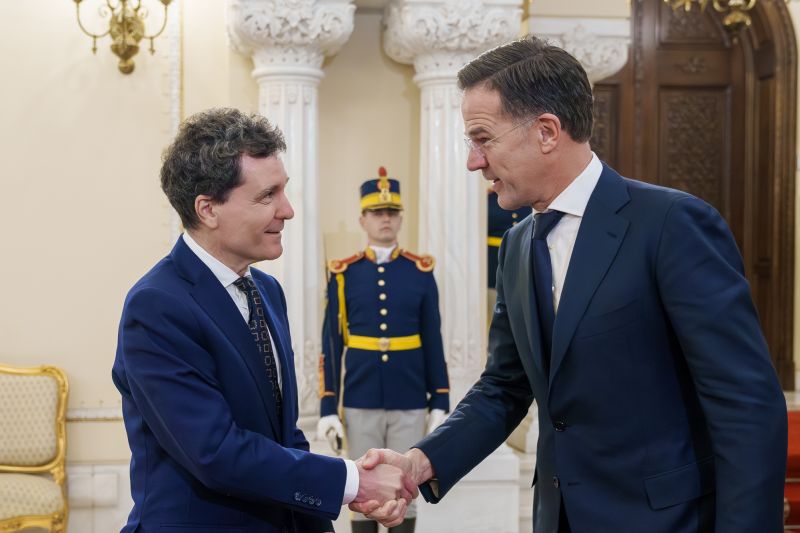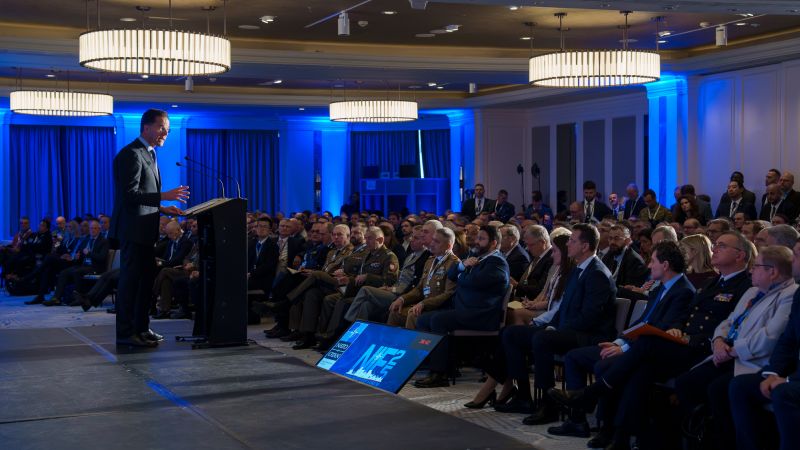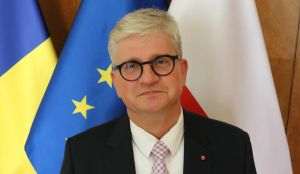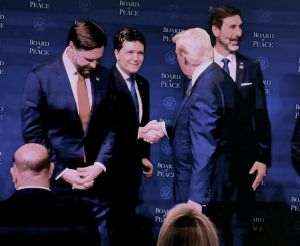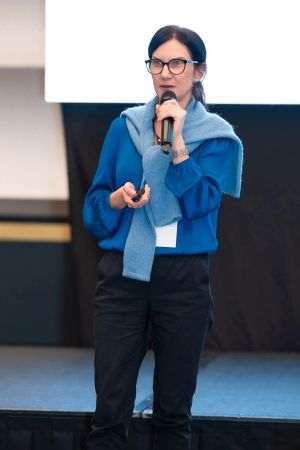Consistent defense investments, rapid production increases and an industrial ecosystem that innovates faster than adversaries are the conditions for European security, said participants in the NATO Defense Industry Forum yesterday, an event that took place in Bucharest, in the presence of President Nicuşor Dan, NATO Secretary General Mark Rutte and Supreme Allied Commander Transformation, General Pierre Vandier. Opening the event, the three senior officials stressed that future financing must be secured through clear budgetary commitments and solid public-private partnerships between companies and governments of the 32 member states, to guarantee deliverability, interoperability and resilient supply chains.
President Nicuşor Dan stated: "The recent context, unfortunately, forces us to talk more and more about rearmament. All the threats and challenges we are currently facing, from the war in Ukraine to cyber threats and hybrid warfare, remind us that peace and security are never guaranteed. Therefore, rearmament is not a choice, it is a necessity. The role of the alliance is to protect peace, and our responsibility is to deter any potential aggression and to ensure that our armed forces are capable and well-prepared to counter the threats we face. We have a continuation of Russia's illegal war against Ukraine right on the Romanian border. (...) Russia's aggressiveness beyond Ukraine through recent violations of allied airspace, as well as through the intensification and diversification of hybrid attacks, is further proof that we must do more to be prepared to defend ourselves. We must we remain united and assume a position of strength through a solid and credible posture. (...) We, the European allies, must assume increased responsibilities in the defense of the continent and in order to increase our military and defense capabilities. And for this it is absolutely necessary to strengthen the national, European, and transatlantic defense industry. The Romanian defense industry has a strong tradition, but it has been, perhaps, like in many other places, neglected in recent years, although there is extraordinary potential. We have companies that have all the conditions, the utilities so that under the conditions of an interesting management they can be used in the need of the coming years to increase the defense industrial production in Europe”.
• Nicuşor Dan: "Romania, ready to assume an increasingly strong role on the eastern flank and for its own security”
He recalled that at the NATO summit in The Hague, which took place in the summer, the leaders of the 32 member states of the alliance decided to significantly increase defense investments in order to reach the target of 5% of gross domestic product by 2035. The country's president also said that Romania has 2.24% of GDP in 2025 for defense, will spend this money and will maintain the upward trend directly correlated with security threats.
Nicuşor Dan added: "But this decision is only a first step to achieving our goal. We must have money and we must spend it to produce military equipment. Also, a key element for ensuring credible deterrence and effective defense is to work together, to produce in cooperation the equipment that allied armed forces need. To collaborate between states, between governments and the private sector for a defense industry that favors innovation and capitalizes on emerging technologies, to ensure together and with our partners durable supply chains and the interoperability of the systems we use”.
The head of state also said that another objective is to develop military mobility on the north-south axis of the eastern flank as part of a coherent and integrated approach from the Baltic Sea to the Black Sea, so necessary in the current security context, to strengthen dual-use capabilities, railways, port facilities on the Black Sea and the Danube, as well as other critical infrastructure elements.
Nicuşor Dan stated: "This is the context in which events such as the NATO-Industry Forum gain increased relevance, precisely through their role in bringing together all the actors involved in this process, NATO, allied states, industry and facilitating direct dialogue between the alliance and the industrial sector. Only by working together will we identify the best solutions for our common challenges. Romania is more defended than ever and ready to assume an increasingly stronger role on the eastern flank and for its own security.”
• Three key factors in the defense industry: quantity, creativity and cooperation
For his part, NATO Secretary General Mark Rutte stated that defense companies are the industrial component of the deterrence that the political-military alliance is trying to achieve, because "there is simply no strong defense without a strong defense industry.” The NATO chief recalled the decisions of the Hague summit, when "leaders agreed to buy more defense capabilities, including planes, tanks, ships, but also drones, ammunition, cyber and space capabilities,” and now an open dialogue with the defense industry is needed to fulfill these commitments.
Mark Rutte said: "Of course, money alone cannot provide security; we need capabilities, we need equipment, real power and, of course, the most advanced technology, because the threats we face are real and long-lasting. Russia's unprovoked war against Ukraine is the most obvious example of the threat. But the post-Russia danger will not end when this one ends. For the foreseeable future, Russia will remain a destabilizing force in Europe and the world. And Russia is not alone in its efforts to undermine global rules. As you know, it is collaborating with China, North Korea, Iran and others. They are increasing their industrial defense collaboration to unprecedented levels. They are preparing for a long-term confrontation. We cannot be naive. We must be prepared. President Roosevelt (ed. - US President Franklin Delano Roosevelt) said that powerful enemies must be outsupplied/resourced and outsold in production/force. And he said that in 1942. The same can be said today. We call it peace through strength. NATO will do its part, and we need industry to do its part. I am confident that together we have what it takes to outgun them, outspeed them and outsmart those who seek to harm us.”
The NATO Secretary General said that to achieve this, the 32 member states of the alliance and their defense industries must focus on three key factors: quantity, creativity and cooperation.
On quantity, Rutte noted that NATO already has state-of-the-art systems that give the alliance an advantage that will be increased, but he noted that increased production and shorter delivery times are needed.
"We are already changing the trend on ammunition. Until recently, Russia produced more ammunition than all NATO allies combined, but that is no longer the case. Across the Alliance, we are now opening dozens of new production lines and expanding existing ones. We are producing more than we have in decades. We need to build on this progress in other areas, from high-performance air defense to low-cost drone interceptors. Here, quantity is key,” the NATO chief said.
Regarding creativity, Mark Rutte referred to the power of innovation, which he said must ensure that we outsmart our adversaries.
The NATO chief said: "There are creative minds, ranging from large, established corporations to small startups. We need what you have to offer. And we live in free societies where your creativity and ingenuity can be tested and you can use NATO as a testing ground. We have the Defence Innovation Accelerator for the North Atlantic (DIANA), with a network of test centers and acceleration sites in several countries. We also have the NATO Innovation Fund, the world's first multi-sovereign venture capital fund. Through this fund, we invest in deeptech, dual-technology startups that can support our defense, resilience and security.”
The NATO representative also referred to the cooperation between the alliance's member states and defense industry companies. Mark Rutte pointed out: "As leaders take political risk, industry is asked to take a certain business risk. (...) You expect governments to sign long-term contracts. I know. And you are right. Sometimes governments have to do that. But I can tell you that when it comes to investing more in our defense, the political will is there. The money is there. The demand is there, and our security depends on it. So, as business leaders, maybe we can make a deal. For my part, I will continue to do everything I can to get governments to keep their promises and sign the contracts. And I promise that we will do everything within NATO to accelerate procurement and continue to support innovation. But in return, you must be prepared. Intensify supply, expand existing production lines and open new ones. Don't let fear or future overcapacity prevent you from meeting the real needs we face today. Trust that what you produce will be bought. There are big business opportunities for all of you and real benefits for all of us, because when industry steps up its supply, the result is not only more security, but also more economic growth and many more jobs.”
• Defence industry, a key part of NATO's deterrence
Supreme Allied Commander Transformation, General Pierre Vandier, referred to the need to accelerate production to keep pace with innovation in defence.
Pierre Vandier said: "The use of new technology and new tactics has never been faster, largely due to software-based change. (...) Well, we need to move towards a posture of continuous adaptation. We need to show that we are able to scale up when needed for the mass, with fast and affordable solutions, and at the same time continue to develop the others. Of course, this means doing this in all areas, especially space and cyber, where the effect of increased speed is felt most strongly. Industry is a key part of NATO deterrence. Let's demonstrate that we can innovate and do so faster than our adversaries, imposing strategies and forcing our adversaries to constantly recalculate theirs, by developing all weapons systems correctly, demonstrating that our industrial and innovation environment is more reactive, more agile and more intelligent. Every time one of you develops something that your opponents have never seen before, every time one of you develops something cheaper, something that can be bought, hidden, adapted or adopted faster, you make NATO more credible.”
Participants at the NATO Defence Industry Forum held in Bucharest discussed during the debates held at this event about the rational approach to new technologies, the capabilities of the defence industry, how technology can contribute to the accomplishment of military missions, the use of modelling and simulation in multi-domain operations or in the concept of cognitive warfare, as well as NATO's digital transformation, which aims to enable the skilled use of connectivity and artificial intelligence.
